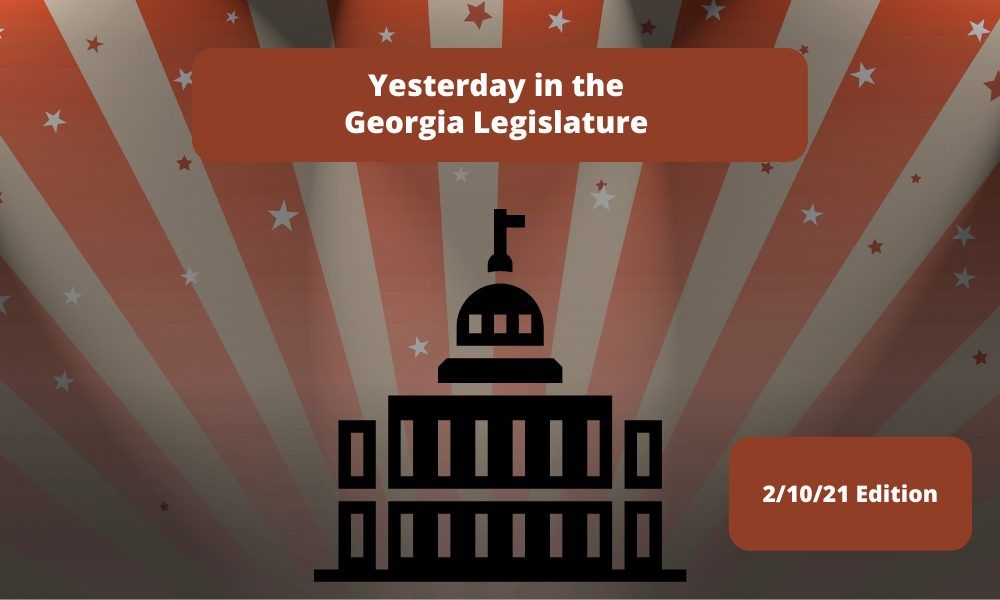This is an informal rundown of the legislative happenings.
The House of Representatives passed the following measures:
HB 105 – Rep. Heath Clark
LINK → https://www.legis.ga.gov/legislation/58952
WHAT THE BILL DOES:
- Updates code 38-2-250 — Basis for paying guardsman for active duty
- Currently, if you volunteer because of a Governor’s order or call, the code section does not authorize or REQUIRE that the volunteers be compensated. If it was challenged in court, the volunteers would not have the code section behind them. This remedies that.
- This has been an issue with cybersecurity events, which draw more volunteers than other situations.
CONCERN: None.
Passed 165-1
HB 112 – Rep. Trey Kelley
LINK → https://www.legis.ga.gov/legislation/58959
WHAT THE BILL DOES:
- Extends sunset on covid-19 liability protections to July 14, 2022
- “Allow businesses to continue to operating during the pandemic,” per Kelley, free of liability so long as reasonable precautions are taken to prevent or avoid negligent spreading of COVID-19.
- Does not impact Workers Compensation
- Here’s how you voted on it last year when it came forward for a vote
Passed 99-68
HB 174 – Rep. Marcus Wiedower
LINK → https://www.legis.ga.gov/legislation/59096
WHAT THE BILL DOES:
- Annual Department of Public Safety update
- Codifies federal regulations from 2020 and incorporates them into the state code.
CONCERN: None.
Passed 167-0
HB 205 – Rep. Noel Williams
LINK → https://www.legis.ga.gov/legislation/59153
WHAT THE BILL DOES:
- A framework of regulating the travel insurance industry. — Passed the House the last two years, but was not taken up in the Senate
- Williams said it “Creates a more level playing field, is a model Act endorsed by NAIC and the National Council of Insurance Legislators” “Protects the consumer.”
- Applies unfair trade practice laws
- Prohibits negative action or opt out requirements
- DOES pertain to cruises
- Previously, the Insurance department came to the legislature and asked for it, 8 other states have gone to this system
- Uniform meanings of the key terms
- Specifically, the text of the bill:
- Defines travel insurance under OCGA 33-23-12
- Also defines ‘Aggregator site’, blanket travel insurance, Cancellation fee waiver, eligible group, Fulfillment materials, group travel insurance, Primary certificate holder,’ travel administrator, travel assistance services, and travel protection plan.
- These are all terms that weren’t codified but now are under this legislation
- Applies to travel insurance sold in the state to people who reside in the state
- Expands who is eligible to sell travel insurance without additional hurdles
- Dictates what documents have to be provided in order to cover travel expenses and for the insurance to be paid out.
CONCERN: Troubling that we are specifically outlining types of groups that qualify under eligible groups. The intention may be good, but the bill creates more government meddling into private contractual agreements between a private entity and a consenting consumer. It’s unfortunate that all of those things are included in a measure that is supposed to make the sales industry component available to more people. So, I guess pick your poison: more codified terms and practices or more people able to sell travel insurance?
Passed 164-0
HB 265 – Rep. David Knight
LINK → https://www.legis.ga.gov/legislation/59265
WHAT THE BILL DOES:
- Annual Internal Revenue Code update
- Takes into account federal code changes and weaves them into the Georgia code
- This year, in particular, changes are federal regulation tweaks to charitable contributions, deductions, and the removal of floors for some amounts of income.
- More procedural than real legislative action.
CONCERN: None.
Passed 166-0
The Senate passed the following measures:
HB 80
LINK–> https://www.legis.ga.gov/legislation/58910
WHAT THE BILL DOES:
- This is the supplemental amended budget for FY 2021.
Passed: 52-0
SB 4 – Sen. Kay Kirkpatrick
LINK –> https://www.legis.ga.gov/legislation/58874
WHAT THE BILL DOES:
- Makes it unlawful for any person to offer a “commission, benefit, bonus, rebate, kickback, or bribe, directly or indirectly, in cash or in kind” or a split-fee arrangement for a referral or recommendation to a substance abuse provider
- Make its unlawful to receive the aforementioned commission, benefit, etc.
- Makes it unlawful to ‘aid and abet’ in the process of offering or receiving a commission, benefit, etc for a referral to a substance abuse provider
- Excludes: discount payment programs permissible under federal law, group practice set-ups, actual payments for healthcare providers, commissions to insurance agents, payments to a health insurance company that offers reimbursements of some type, and otherwise lawful insurance gifts.
- Above crimes that involve 10 or fewer patients would be misdemeanor offenses punishable by up to 1 year in prison and $1,000 fine PER VIOLATION
- Above crimes involving 10-20 patients would be felony offense with up to 5 years in prison and $100,000 fine PER VIOLATION
- 20 or more patients is a felony offense with up to 10 years in prison and a $500,000 fine PER VIOLATION.
- Attorney General and respective circuit district attorneys would have authority to prosecute/determine venue
- As a second provision in the bill, a new code section would be added prohibiting fraudulent ‘high tech drug testing’ (which is when more than one substance is tested on each specimen, but the insurance or billing practice bills each substance test individually
- This bill would make it unlawful for any person to fraudulently bill/ bill the insurance provider of “the elderly, the disabled, or any individual affected by pain, substance abuse, addiction, or other disorder”
- Includes upcoding, billing for things not tested/provided, billing for something covered under insurance, billing for multiple co-payment amounts, and billing for unbundled services which would otherwise be bundled for coverage
- Makes it a misdemeanor offense punishable by up to 1 year in prison and a $1,000 fine.
Passed: 52-0
Both the House and the Senate approved SR 82, which is the schedule and adjournment resolution for days 15 through 25 of the legislative session.
Link –> https://www.legis.ga.gov/legislation/59455








